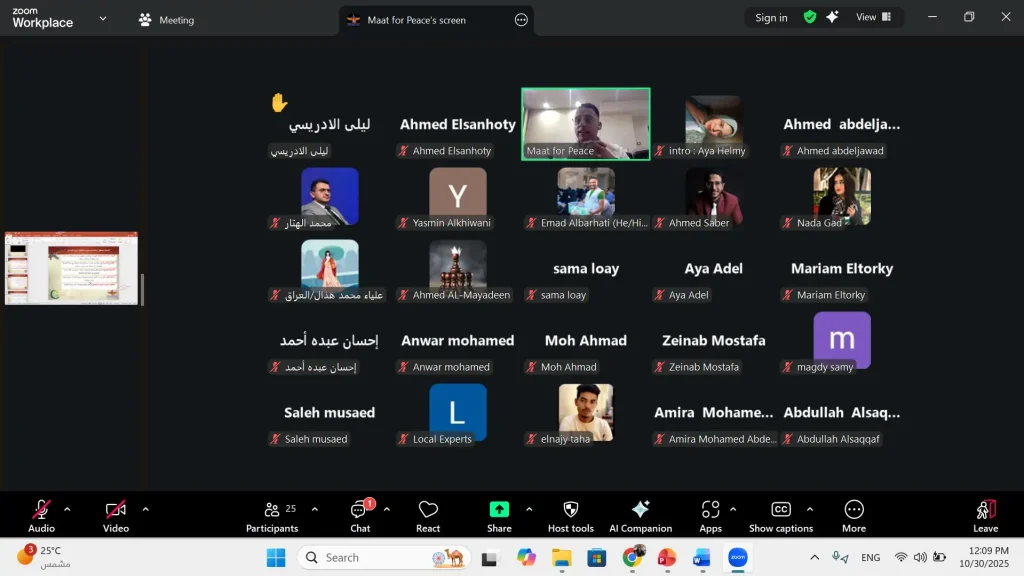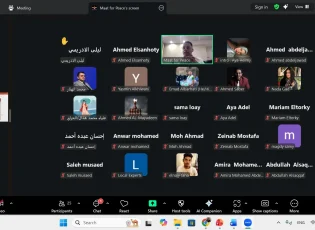Okeil: We recommend the necessity of providing legal protection and a safe working environment for journalists during times of conflict.
Maat for Peace, Development and Human Rights held an event on “The Impact of Information Manipulation on Press Freedom during Conflicts and Armed Conflicts,” on the sidelines of the celebration of World Press Freedom Day, which falls on May 3 of each year. The event was attended by Ayman Okeil, an international human rights expert and President of Maat; Muhammad Awad, Al Arabiya channel correspondent in the Gaza Strip; Asiya Jaafar, journalist, human rights defender, and professional director of the Azza Center supporting journalists' rights in Sudan; in addition to Ahed Yassin, a Yemeni journalist; and Suha Al-Banna, the program and project coordinator at the East-West Center in Jordan.
In this context, international legal expert Ayman Okeil said that many journalists are subjected to defamation campaigns, especially through social media, which mainly rely on spreading false information about them. During the event, Okeil pointed to the systematic and deliberate methods of misinformation carried out by the Israeli occupation forces since 7 October 2023. They've been targeting media outlets that uncovered that expose the truth and documente the genocide and crimes against humanity they've committed, and intimidate journalists working in Yemen, Libya, and Syria.
Okeil recommended that journalists should have the ability to confront misinformation during armed conflicts in the region and the Middle East, the necessity of supporting civil society organizations to eliminate false information, and the importance of providing legal protection and a safe working environment for journalists.
Mohammed Awad, the correspondent for the Al-Arabiya channel in Gaza, highlighted that Israel's attempt at media manipulation failed, leading them to target journalists instead. There are several ways to verify information, whether from official sources or others. There are multiple options to ensure the accuracy of information and others, spreading correct information and verifying it is a national duty.
Asia Jaafar, journalist and professional director of the Azza Center supporting journalists' rights in Sudan, emphasized that misleading information instills negative perceptions and the inability to search for accurate information. Journalists play a crucial role in verifying information by tracing its sources. Asia Jaafar suggested that civil society organizations should organize training sessions for journalists and media professionals on information verification techniques.
Ahed Yassin, the Yemeni media personality and journalist, stated that the parties involved in the conflict use informational deception as a weapon to achieve their goals and support their power. Ahed Yassin stressed that the lack of credibility of the media has led citizens to turn to social media and independent journalism to obtain information because they are the available means during periods of conflict.
Soha Al-Banna, program and project coordinator at the East-West Center in Jordan, noted that there are restrictions on funding civil society organizations. This hinders their role in holding training workshops to combat media disinformation and using verification tools. Soha Al-Banna added that civil society organizations often struggle to secure sustainable funding.
Marina Sami, the media unit director at Maat, concluded the event by saying that obstructing investigative reports limits the free flow of information in conflict areas, which affects the freedom of the press and the physical and psychological safety of journalists. Marina Sami confirmed that Maat will complete a series of training and workshops for journalists that promote awareness of verifying information disseminated on the internet.
shortlink: https://maatpeace.org/en/?p=42139















